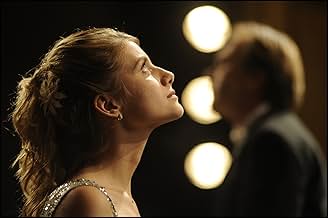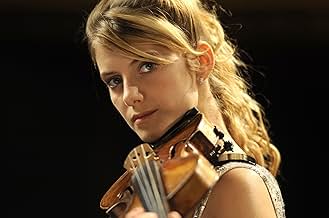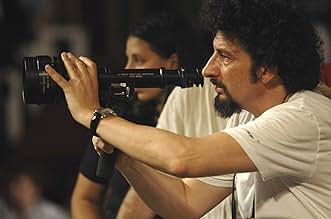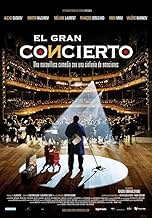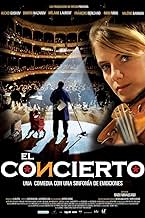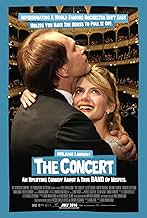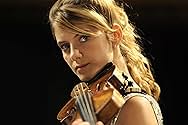AVALIAÇÃO DA IMDb
7,5/10
19 mil
SUA AVALIAÇÃO
Adicionar um enredo no seu idiomaThirty years ago Bolshoi Orchestra conductor Andreï Filipov was fired for hiring Jewish musicians. Now a lowly janitor, an opportunity arises to gather his old musicians to go and pose as th... Ler tudoThirty years ago Bolshoi Orchestra conductor Andreï Filipov was fired for hiring Jewish musicians. Now a lowly janitor, an opportunity arises to gather his old musicians to go and pose as the official Bolshoi orchestra in Paris.Thirty years ago Bolshoi Orchestra conductor Andreï Filipov was fired for hiring Jewish musicians. Now a lowly janitor, an opportunity arises to gather his old musicians to go and pose as the official Bolshoi orchestra in Paris.
- Direção
- Roteiristas
- Artistas
- Prêmios
- 9 vitórias e 16 indicações no total
Dmitriy Nazarov
- Aleksandr 'Sasha' Abramovich Grosman
- (as Dimitri Nazarov)
Miou-Miou
- Guylène de La Rivière
- (as Miou Miou)
Valeriy Barinov
- Ivan Gavrilov
- (as Valeri Barinov)
Anna Kamenkova
- Irina Filipova
- (as Anna Kamenkova Pavlova)
Anghel Gheorghe
- Vassili
- (as Anghel Gheorghe dit 'Caliu Din Clejani')
Aleksandr Komissarov
- Viktor Vikich
- (as Alexander Komissarov)
Guillaume Gallienne
- Laudeyrac
- (as Guillaume Gallienne de la Comédie Française)
Avaliações em destaque
It was the screening of the Japanese film Nodame Cantabile earlier this year that piqued my interest in classical music being featured on film, but I suppose it's Le Concert that sealed the deal, although this European film did exude similar sensibilities like the Japanese one in having a conductor face insurmountable odds in turning around a makeshift, rag-tag 55 piece orchestra into one befitting of the name "Bolshoi", building up to a crescendo of a finale that just begs for an encore.
Nodame Cantabile provided a lot more romantic fluff and a quick 101 introduction to classical music and its famed composers, sort of like a McDonald's way of a fast-food sampling rich musical pieces, but it is Le Concert that persisted in wanting to use Tchaikovsky's The Violin Concerto, which is considered as one of the most difficult for the violin, to center this film around it, complete with a huge and critical backstory that makes this film well rounded, and in keeping you engaged especially with a tale about passion bordering on obsession, and the redemption of the sins of the earlier generation.
But don't get me wrong that the film is solely filled with such serious themes, as it's almost comedy all of the way to its centerpiece performance. We follow the story of Andrei Filipov (Aleksei Guskov), a one time hotshot conductor of the Bolshoi orchestra who was cut down to size, and now works as the janitor in the halls of his glorious past. He chances upon an opportunity from Paris which had invited the Bolshoi, but hence decides to hijack this opportunity, and to bring his own team of musicians on a trip that they would never forget. He's a man on a mission, and you just might wonder why he would want to take such a big risk, other than the fact that the current Bolshoi orchestra is playing like crap, but it adds to the mystery of the man, and the past that he's hiding from through the bottle.
Together with best friend Sacha (Dmitri Nazarov) who's now an ambulance driver, they go back to assemble a team comprising colleagues from the past, who have each moved onto different occupations, to convince them in joining their madcap mission - to showcase their talent once again after 30 years since their disbanding. The first component of the narrative is steeped in their mission to raise funds and sponsorship, and to seek the help of one time adversary Ivan Gavrilov (Valeriy Barinov), an ex-KGB agent who had a hand in their demise, to see them through this 3 day trip through deliberate misrepresentation because of his fluency in French.
But of course things aren't exactly the same as some 30 years back, and everyone has their own personal agenda in wanting to go to Paris, and more so when they cross borders through forged credentials, complete with a whole slew of comedy of errors when they touchdown in the City of Lights. Some may find it a tad offensive when the Russians are portrayed as boorish, from their drunk behaviour to their unreasonableness in demanding per diems immediately, for services yet to be rendered, or that Jewish Father-Son team who's more interested to fleece unsuspecting victims in their get-rich schemes.
Otherwise, director Radu Mihaileanu will keep you guessing just how this group under Filipov will succeed given their disastrous start pointing to an early debacle, and more so when star violinist Anne-Marie (Melanie Laurent of Inglourious Basterds fame) start to see through their ruse and refuse to take the stage with a bunch of unprofessionals. There's a little mystery here with regards to Anne-Marie's lineage that I have to applaud Mihaileanu for his red herrings and writers Hector Cabello Reyes and Thierry Degrandi for avoiding the obvious. Herein lies what would be a touching theme of music and harmony, of how it can bring out a unifying set of emotions, which leads on to pure aural bliss in the final act that one cannot help but to clap out loud at the end, as narrative threads get resolved, even though it resembled pretty much like a typical Japanese zero to hero tale.
The Concert won the Cesar for Best Music Written for a film and Best Sound, and it's not difficult to see why. With an excellent ensemble cast, sights, sounds and of course, Tchaiskovski, this is a film that succeeded in making classical music so integral to itself, without being too stifling for the masses to be a crowd pleaser. Highly recommended, and it goes into my books as one of the best this year!
Nodame Cantabile provided a lot more romantic fluff and a quick 101 introduction to classical music and its famed composers, sort of like a McDonald's way of a fast-food sampling rich musical pieces, but it is Le Concert that persisted in wanting to use Tchaikovsky's The Violin Concerto, which is considered as one of the most difficult for the violin, to center this film around it, complete with a huge and critical backstory that makes this film well rounded, and in keeping you engaged especially with a tale about passion bordering on obsession, and the redemption of the sins of the earlier generation.
But don't get me wrong that the film is solely filled with such serious themes, as it's almost comedy all of the way to its centerpiece performance. We follow the story of Andrei Filipov (Aleksei Guskov), a one time hotshot conductor of the Bolshoi orchestra who was cut down to size, and now works as the janitor in the halls of his glorious past. He chances upon an opportunity from Paris which had invited the Bolshoi, but hence decides to hijack this opportunity, and to bring his own team of musicians on a trip that they would never forget. He's a man on a mission, and you just might wonder why he would want to take such a big risk, other than the fact that the current Bolshoi orchestra is playing like crap, but it adds to the mystery of the man, and the past that he's hiding from through the bottle.
Together with best friend Sacha (Dmitri Nazarov) who's now an ambulance driver, they go back to assemble a team comprising colleagues from the past, who have each moved onto different occupations, to convince them in joining their madcap mission - to showcase their talent once again after 30 years since their disbanding. The first component of the narrative is steeped in their mission to raise funds and sponsorship, and to seek the help of one time adversary Ivan Gavrilov (Valeriy Barinov), an ex-KGB agent who had a hand in their demise, to see them through this 3 day trip through deliberate misrepresentation because of his fluency in French.
But of course things aren't exactly the same as some 30 years back, and everyone has their own personal agenda in wanting to go to Paris, and more so when they cross borders through forged credentials, complete with a whole slew of comedy of errors when they touchdown in the City of Lights. Some may find it a tad offensive when the Russians are portrayed as boorish, from their drunk behaviour to their unreasonableness in demanding per diems immediately, for services yet to be rendered, or that Jewish Father-Son team who's more interested to fleece unsuspecting victims in their get-rich schemes.
Otherwise, director Radu Mihaileanu will keep you guessing just how this group under Filipov will succeed given their disastrous start pointing to an early debacle, and more so when star violinist Anne-Marie (Melanie Laurent of Inglourious Basterds fame) start to see through their ruse and refuse to take the stage with a bunch of unprofessionals. There's a little mystery here with regards to Anne-Marie's lineage that I have to applaud Mihaileanu for his red herrings and writers Hector Cabello Reyes and Thierry Degrandi for avoiding the obvious. Herein lies what would be a touching theme of music and harmony, of how it can bring out a unifying set of emotions, which leads on to pure aural bliss in the final act that one cannot help but to clap out loud at the end, as narrative threads get resolved, even though it resembled pretty much like a typical Japanese zero to hero tale.
The Concert won the Cesar for Best Music Written for a film and Best Sound, and it's not difficult to see why. With an excellent ensemble cast, sights, sounds and of course, Tchaiskovski, this is a film that succeeded in making classical music so integral to itself, without being too stifling for the masses to be a crowd pleaser. Highly recommended, and it goes into my books as one of the best this year!
Greetings again from the darkness. Typically when a film is billed is a "French comedy", we can expect a farcical good time with self-centered characters who flitter their days away. Director Radhu Mihaileanu delivers something completely different and unexpected.
Two really fine performances drive this story. Aleksei Guskov plays Andrei Filipov, the one time conductor of the Bolshoi orchestra, who lost his beloved job because he employed Jewish musicians during the harshest of Communist days. Nearly three decades later he finds himself as the janitor in the same hall where he once conducted. Because of this, an opportunity presents itself that allows him to seek redemption in his own life, and that of another.
Melanie Laurent, who was so outstanding as the theatre manager with a nasty plan in Inglourious Basterds, plays Anne-Marie Jacquet - a violin virtuoso who Filipov demands to have in his orchestra for a show in Paris. Ms. Laurent displays tremendous screen presence with minimal dialogue. She is quite a talent and I hope she spends more time in the U.S. making movies! The comedy portion of the film occurs as Filipov frantically assembles his orchestra from all over the city. They have each gone their separate ways and some no longer even have their own instruments. Of course, none of the musical portion is believable, but as I said, this is a story of redemption.
The film climaxes with a wonderful onstage performance combined with a startling montage that really puts the details into the story that's been skirted for the first 90 minutes. It is a wonderful ending to a decent film that really had the potential to be amazing.
Two really fine performances drive this story. Aleksei Guskov plays Andrei Filipov, the one time conductor of the Bolshoi orchestra, who lost his beloved job because he employed Jewish musicians during the harshest of Communist days. Nearly three decades later he finds himself as the janitor in the same hall where he once conducted. Because of this, an opportunity presents itself that allows him to seek redemption in his own life, and that of another.
Melanie Laurent, who was so outstanding as the theatre manager with a nasty plan in Inglourious Basterds, plays Anne-Marie Jacquet - a violin virtuoso who Filipov demands to have in his orchestra for a show in Paris. Ms. Laurent displays tremendous screen presence with minimal dialogue. She is quite a talent and I hope she spends more time in the U.S. making movies! The comedy portion of the film occurs as Filipov frantically assembles his orchestra from all over the city. They have each gone their separate ways and some no longer even have their own instruments. Of course, none of the musical portion is believable, but as I said, this is a story of redemption.
The film climaxes with a wonderful onstage performance combined with a startling montage that really puts the details into the story that's been skirted for the first 90 minutes. It is a wonderful ending to a decent film that really had the potential to be amazing.
I received warm recommendations before going to see "Le concert" and, as a consequence, was prepared to like it.
I must admit that hearing one of my favourite classical pieces at the beginning induced a positive outlook; however, as I am rather critical, this would not have made up for a boring experience afterwards.
Yet the rest was delightful, and there was no moment left for fatigue or dissatisfaction. Those clichés criticized by some are still well understood in Eastern Europe; as to the exacerbated kitsch - it can be found today, with no difficulty, within the society I live in.
The plot may have seemed straightforward, but a whirlwind of colour, wonderful music, sadness and humour carried me swiftly to the end and to the applause of the audience in the cinema.
It may not be the best film I have seen, but it certainly possesses the "je ne sais quoi" that makes you want to see it again, that makes you feel different for having experienced it. And for this, I think "Le Concert" should be accepted and loved just as it is.
I must admit that hearing one of my favourite classical pieces at the beginning induced a positive outlook; however, as I am rather critical, this would not have made up for a boring experience afterwards.
Yet the rest was delightful, and there was no moment left for fatigue or dissatisfaction. Those clichés criticized by some are still well understood in Eastern Europe; as to the exacerbated kitsch - it can be found today, with no difficulty, within the society I live in.
The plot may have seemed straightforward, but a whirlwind of colour, wonderful music, sadness and humour carried me swiftly to the end and to the applause of the audience in the cinema.
It may not be the best film I have seen, but it certainly possesses the "je ne sais quoi" that makes you want to see it again, that makes you feel different for having experienced it. And for this, I think "Le Concert" should be accepted and loved just as it is.
The Concert is a French/ Italian/Romanian/Belgian production shot in Moscow and Paris. The publicity blurb says that the musical finale is worth the ticket price alone, but I would say even reading the list of exotic names floating over the opening credits is worth a good percentage of the price.
We travel back 30 years to when Andrei, talented young conductor of the Bolshoi Orchestra, was humiliated and sacked by Breshnev for refusing to get rid of his Jewish musicians. Fast forward to the present, and we find him still working at the Bolshoi - but as a cleaner. One lucky day he finds himself alone with the office fax machine. What follows is an audacious plot to get his old sidekicks to Paris, using borrowed instruments, hired suits and fake passports, posing as the real Bolshoi for a concert at the Theatre du Chatelet. If you can imagine a story as full of colour and drama as the TV rock 'n' roll serial epic Tutti Frutti, jammed into just one cinema experience, this could be it. It's rare to see so many set pieces in one film.
I laughed out loud once or twice - and if you know what a grumpy old man I am you would realise what that means. I was also moved to tears, but I'm not telling you why. That would spoil it all - just saying that under its layer of manic fast-cut comedy the story carries a deep, dark and passionate secret which gradually reveals itself as the comedy peels off. The music is, I have to add, beautiful - whether it's Roma dance jigs in the street or Tchaikovsky in the concert hall. Bring a hanky!
We travel back 30 years to when Andrei, talented young conductor of the Bolshoi Orchestra, was humiliated and sacked by Breshnev for refusing to get rid of his Jewish musicians. Fast forward to the present, and we find him still working at the Bolshoi - but as a cleaner. One lucky day he finds himself alone with the office fax machine. What follows is an audacious plot to get his old sidekicks to Paris, using borrowed instruments, hired suits and fake passports, posing as the real Bolshoi for a concert at the Theatre du Chatelet. If you can imagine a story as full of colour and drama as the TV rock 'n' roll serial epic Tutti Frutti, jammed into just one cinema experience, this could be it. It's rare to see so many set pieces in one film.
I laughed out loud once or twice - and if you know what a grumpy old man I am you would realise what that means. I was also moved to tears, but I'm not telling you why. That would spoil it all - just saying that under its layer of manic fast-cut comedy the story carries a deep, dark and passionate secret which gradually reveals itself as the comedy peels off. The music is, I have to add, beautiful - whether it's Roma dance jigs in the street or Tchaikovsky in the concert hall. Bring a hanky!
I liked Le Train De La Vie, but i loved Le Concert. Mihaileanu keeps things simple and withholds just a couple of info, in order to reveal the actual truth at the end of the movie. He creates a drama without forcing you into tears from the beginning, consolidating every dramatic moment with a gag, joke or just a funny face. He builds funny characters, that you can enjoy seeing without being worn off by their problems or issues.
He was able to make a 2 hours film that envelopes so much about drama, failure, communism, music and dedication that is quite impossible not to appreciate. This movie was quite a joy.
He was able to make a 2 hours film that envelopes so much about drama, failure, communism, music and dedication that is quite impossible not to appreciate. This movie was quite a joy.
Você sabia?
- CuriosidadesMelanie Laurent started learning to play the violin only a few months before production. For the concert scenes, she learned all the bow movements, so her bow would always be on the correct string and move convincingly. However, her left hand (and sometimes arm) were digitally added/replaced in post-production.
- Erros de gravaçãoWhen Filipov, Gavrilov, and Grossman are meeting with the man will provide them and the orchestra passports to Paris, he says that when it is evening in Moscow it is morning in Paris. This is impossible because there is only a two hour time difference between the two cities.
- Cenas durante ou pós-créditosThe director's father, Ion Mihaileanu, is credited as "diligent and attentive spectator and supporter of the film"
- ConexõesFeatures La Candidate (2002)
- Trilhas sonorasViolin Concerto in D Major op. 35
Composed by Pyotr Ilyich Tchaikovsky (1878)
Performed by The Budapest Symphony Orchestra
(P) 2010 Les Productions Du Tresor / Oi Oi Oi Productions Under Exclusive License To Milan Entertainment, Inc
Principais escolhas
Faça login para avaliar e ver a lista de recomendações personalizadas
- How long is The Concert?Fornecido pela Alexa
Detalhes
- Data de lançamento
- Países de origem
- Central de atendimento oficial
- Idiomas
- Também conhecido como
- The Concert
- Locações de filme
- Empresas de produção
- Consulte mais créditos da empresa na IMDbPro
Bilheteria
- Faturamento bruto nos EUA e Canadá
- US$ 657.986
- Fim de semana de estreia nos EUA e Canadá
- US$ 21.742
- 1 de ago. de 2010
- Faturamento bruto mundial
- US$ 41.146.351
- Tempo de duração1 hora 59 minutos
- Cor
- Mixagem de som
- Proporção
- 2.35 : 1
- 2.39 : 1
Contribua para esta página
Sugerir uma alteração ou adicionar conteúdo ausente



